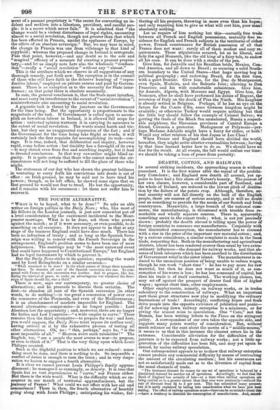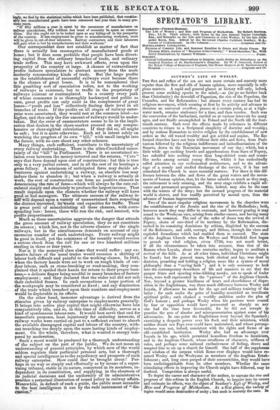DEARTH, COTTON, AND RAILWAYS.
IN several striking incidents, the approaching season is without precedent. It is the first winter after the repeal of the prohibi- tory Corn-laws • and England sees dearth all around, yet ap- pears to have had a fair share of Nature's bounty. The poorest of her own classes however, a considerable part of Scotland, and the whole of Ireland, are reduced to the lowest pitch of destitu. tion by the failure of the potato crop. Although, therefore, ac- tual scarcity will not fall directly on the bulk of the English people, there are sources of serious anxiety, and it will no doubt cost us something to provide for the needs of our Scotch and Irish countrymen. Meanwhile, a large branch of the national com- merce, the manufacturing, is threatened with trouble from re- markable and wholly separate sources. There is, apparently, something amiss in the export trade ; what, is not yet precisely shown : probably the dearth abroad is telling upon the power of foreign countries to consume our manufactures. Conjointly with that diminished consumption, the manufacturer has to contend with a rise in the price of the important raw material cotton ; and by a curious coincidence, a similar complaint is made in the linen trade, respecting flax. Both in the manufacturing and agricultural districts, labour has been rendered scarcer than usual by two extra- ordinary influences—the demand for railway works and that ab• sence of Irish labourers which has been ascribed to the distribution of Government relief in the sister island. The manufacturer is re- duced to the anomalous position of being unable to reduce wages, though he can work "short time " : he has to pay more for raw material, but then he does not want so much of it, as con- sumption of his wares is less ; he has less command of capital, but then his trade is of itself contracted. The working classes, too, may set off against the prospect of dearer food that of higher wages ; against short time, other employments.
Other employments, namely, on railway works, or in trades subsidiary to the construction of railways. What an important part these great structures now play in modifying the ordinary fluctuations of trade! Accordingly, conflicting hopes and fears drive people into the opposite extremes of jubilation and panic— all for screwing down railway enterprise to a minimum, or for giving the utmost reins to speculation. One "Cato,"- not the Roman, has been writing letters to the Times on the stringent policy. A correspondent of our own takes the opposite side, and suggests many points worthy of consideration. But, without much reliance on the cant about the merits of a "middle-course,!' it seems to us that in this instance the clearest errors lie in the extremes. Considerable alleviation for the difficulties of the juncture is to be expected from railway works ; not a little ag- gravation of the difficulties has been felt, and may yet again be caused, by undue railway speculation.
Our correspondent appears to us to show that railway enterprise cannot produce any commercial difficulty by means of contracting the amount of the circulating medium' but his assurances are not so satisfactorily made out as to the diversion of capital from the usual channels of trade.
"The increased demand for money for one set of operations is balanced by a diminished demand for another set of operations. Accordingly, we find that the Bank of England has actually of late—at a time when railway operations are being carried on to a greater extent than they ever were previously—reduced the rate of discount from si to 8 per cent This has astonished many persons; but it is easily explained by taking into consideration what we have just been stating. The effect of railway operations must—there can be no mistake about this —have a tendency to diminish the consumption of manufactures. And, accord-
iugly, we find by the statistical tables which have been published, that consider- ably less manufactured goods have been consumed last year than in many pre- vious years.
"If fifty millions a year is spent by the consumers of manufactures on railway speculations, fifty millions less must of necessity be spent on commo- dities. But this ought not to be looked upon as any falling-off in the prosperity of the country. If less employment be given to manufacturing workmen, more will be given to out-of-door labourers. Railway contractors and their labourers will gain what is lost by manufacturers and their workmen." Our correspondent does not establish as matter of fact that there is actually less consumption of manufactured goods at home ; but it does seem probable that people have been divert- ing capital from the ordinary branches of trade, and ordinary trade suffers. This may have awkward effects, even upon the prosperity of the country at large. A chance of extraordinary profits induces speculators to abstract money from the more modestly remunerating kinds of trade. But the large profits on the establishment of successful railways exist because there is the chance of great losses. It is to be remembered that this gambling sort of speculation refers, not to the working of railways in existence but to traffic in the proprietary of railways existent or contemplated. In a country every path of whose commerce is so thoroughly hackneyed and public as ours, great profits can only exist as the complement of great losses— profit and loss" collectively finding their level in all branches of trade. If the profits on all stages of railway enter- prise were ascertained, they would rest at the common level—no higher, and then only the due amount of railways would be under, taken. But the error of commentators seems to lie in the impli- cation that dealers in the share-market proceed on any compre- hensive or clear-sighted calculations. If they did so, all might be safe ; but it is quite otherwise. Each set is intent solely on watching the progress of its own "bill," with small insight into the future, with no care about any other schemes.
Many things, each sufficient, contribute to the uncertainty of every railway undertaking. There is the ultra-Crockford uncer- tainty of the "bill" in Parliament. There is no ascertained re- lation even between the money invested and the returns. "Cato" says that fares depend upon cost of construction : but this is true only to a very partial extent, and in all the rest of its bearings a gross fallacy. A minimum of anticipated fares may decide ad- venturers against undertaking a railway, an absolute loss may induce them to abandon it ; but when a railway is actually at work, the cost of construction can form no positive element in determining the rate of fares—which will always be the rate cal- culated simply and absolutely to produce the largest income. That result depends upon the chances whether the railway will have good or bad managers. The ultimate success of the railway it- self will depend upon a variety of unascertained facts respecting the district traversed, its 'wants and capacities for traffic. There is great peril of miscalculating all these chances, with corre- sponding loss : hence, those who run the risk, and succeed, win profits proportionate.
Much as these uncertainties aggravate the danger that attends the gross amount of railway speculation, they do not constitute its essence ; which lies, not in the adverse chances of the single railways, but in the simultaneous demands on account of any enormous number of such undertakings. Every railway might be good in itself, yet the conidierce of the country would receive a serious shock from the call for one or two hundred millions sterling in three or four years.
Nor is it the moneyed class dose that would suffer : any ex- tensive failure of the usual trades would occasion a shifting of labour both difficult and painful to the working classes. In 1842, • when the factory hands were set to work on rough kinds of out-
door labour, such as stone-breaking or road-making, they com- plained that it spoiled their hands for return to their proper busi- ness,— a delicate finger being needful in many branches of factory employment ; and they declared that the ruder toil did not suit their enfeebled frames. In such occupations a large portion of the workpeople may be considered as fixed ; and any diminution of the trade which trenched upon their numbers and employment would be deplorable in its effects. On the other hand, immense advantage is derived from the stimulus given by railway enterprise to employments generally. It brings into active play capital that might otherwise have lain comparatively idle, and so, in this time of difficulty, serves as a kind of spontaneous labour-rate. It would best serve that end for immediate purposes, least injuriously for enduring interests, if railway works were carried on just to a sufficient extent to absorb the available disengaged capital and labour of the country, with- out trenching too deeply upon the more listing kinds of employ- ment. On the whole, therefore, what is wanted is energy tem- pered by moderation. Such a mood would be produced by a thorough understanding of the subject on the part of the public. We do not mean an understanding of general principles, by which men of the world seldom regulate their particular personal acts, but a thorough and special intelligence as to the expediency and prospects of each railway enterprise. How could that be brought about? Per- haps in no way so simply and effectually as by means of a super- vising tribunal, stable in its nature, competent in its members, in- dependent in its constitution, and supplying in the clearness of its judicial decisions and the uniformity of its administrative practice a perpetual illustration of sound policy in railway affairs. Meanwhile, in default of such a guide, the public must scramble to the best intelligence it can by the rude instrument of " dis- cussion."



























 Previous page
Previous page